PLEASE NOTE:
While the following article relates to your Google search, the services and methods at Goodwin Hypnosis may differ from those mentioned below. Since 2007, we have helped thousands of clients to overcome emotional and behavioral challenges when all else had failed. According to many of them (and their referring healthcare providers), our methods are faster than talk therapy, easier than willpower, and safer than medication. If you’re ready to resolve your issues, skip the article and visit the rest of our website, where you can learn about our unique approach, watch client testimonial videos, and discover how working with us one-on-one could be the solution you’ve been searching for.
Introduction
In a world where the pace of life often feels overwhelming, finding ways to nurture heart health has never been more essential. With rising stress levels and the demands of daily living, many individuals seek effective strategies to manage their heart rate and overall well-being. This article explores a comprehensive approach to heart health, offering practical lifestyle changes, immediate techniques for calming a racing heart, nutritional insights, and mindful practices that can significantly impact heart rate management.
By integrating these compassionate strategies into daily routines, individuals can cultivate a sense of calm and resilience, ultimately paving the way for a healthier heart and a more balanced life.
Lifestyle Changes to Effectively Lower Your Heart Rate
To effectively reduce your pulse and promote a sense of tranquility, consider incorporating these lifestyle modifications into your daily routine:
- Stay Hydrated: Prioritize drinking plenty of water throughout the day. Proper hydration is vital for maintaining optimal blood circulation and supporting your overall health. Research shows that even slight dehydration can result in a rise in pulse. For instance, a study published in the Journal of Applied Physiology found that dehydration can elevate pulse rate by up to 10 beats per minute. Remember, hydration plays a key role in cardiovascular health, and staying well-hydrated can significantly impact how your circulatory system functions.
- Exercise Regularly: Aim to incorporate moderate exercise into your schedule, whether it's a gentle walk, swimming, or cycling for at least 30 minutes most days of the week. Participating in regular physical activity not only strengthens the organ but also promotes efficient function. As stated by the American Heart Association, consistent physical activity can reduce resting pulse levels by enhancing cardiovascular fitness, leading to decreased pulse levels over time.
- Limit Caffeine and Alcohol: Both caffeine and alcohol can increase your pulse. Consider reducing your intake or opting for herbal teas and non-alcoholic beverages instead. This shift can help create a more calming environment for your heart.
- Get Enough Sleep: Strive for 7-9 hours of quality sleep each night. Lack of sleep can elevate tension levels and, as a result, your pulse. Prioritizing restful sleep is essential for maintaining a healthy cardiovascular system and overall well-being.
- Practice Mindfulness and Relaxation: Incorporate mindfulness practices such as yoga or meditation into your routine. These activities not only alleviate stress but also encourage relaxation, gradually assisting in lowering your pulse rate over time. As Henry Kissinger humorously noted,
There cannot be a stressful crisis next week. My schedule is already full; essentially, discovering moments of tranquility amidst a hectic life can greatly enhance your well-being.
Moreover, recent advancements such as the O2 Health Monitor in the UK enable elderly individuals to track their cardiovascular status effectively and send emergency alerts to hospitals and family members for prompt aid. By implementing these minor but significant adjustments, you can foster a supportive atmosphere for your wellbeing, ultimately resulting in enhanced health and a greater sense of wellness.
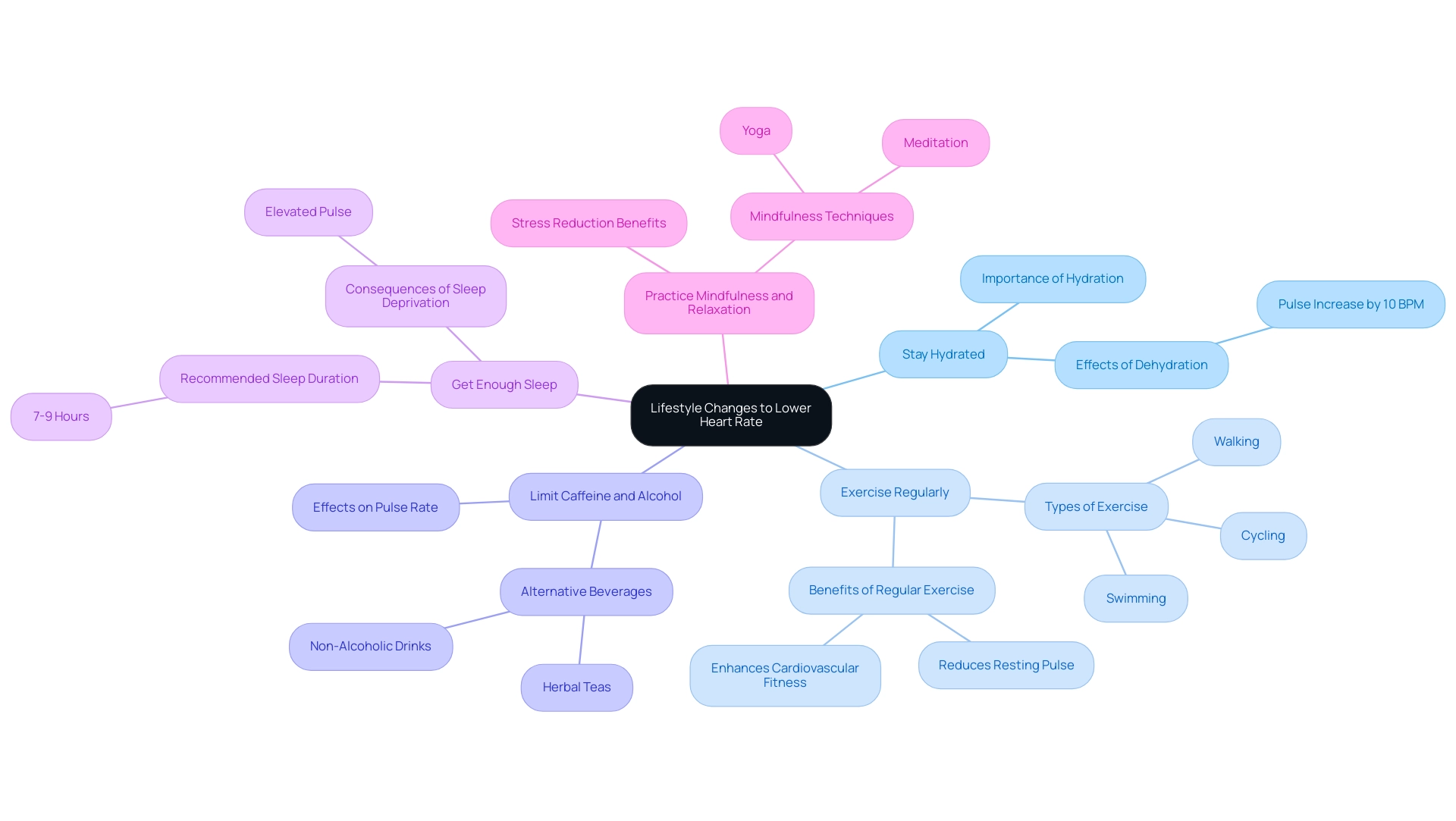
Techniques and Practices for Immediate Heart Rate Reduction
When seeking immediate relief from a racing heart, consider these gentle yet effective techniques, especially if you understand that panic attacks often stem from psychological triggers and can be exacerbated by conventional treatments, which may not address the underlying issues effectively:
-
Deep Breathing Exercises: Gently inhale through your nose for a count of four, hold for four, and then exhale slowly through your mouth for a count of six. This simple rhythm can be repeated several times to engage your body's natural relaxation response, fostering a sense of calm and control. Recent studies suggest a post-intervention reduction in pulse by roughly 2.5 beats per minute following the introduction of slow breathing exercises, emphasizing its effectiveness.
-
Vagal Maneuvers: Methods such as the Valsalva maneuver—holding your breath and gently pushing down—can stimulate the vagus nerve, which is essential in controlling pulse. It’s important to consult with a healthcare professional before trying this, as personal circumstances may vary, particularly for those experiencing anxiety or panic attacks.
-
Progressive Muscle Relaxation: Begin by tensing and then relaxing each muscle group, starting from your toes and gradually moving up to your head. This practice not only alleviates physical tension but also encourages a deep sense of relaxation that can effectively lower pulse, countering the cycle of anxiety.
-
Visualization: Close your eyes and picture a serene, peaceful setting. Focus on the intricate details of this imagined environment, allowing your mind to drift away from stressors. This mental escape can promote a deeper state of relaxation, crucial for managing panic symptoms.
-
Cold Water Immersion: Splashing cold water on your face or taking a cold shower can offer a fast and efficient method to stimulate the vagus nerve, thereby reducing your pulse. This method can be surprisingly refreshing and grounding, serving as a practical tool in your anxiety management toolkit.
Additionally, while talking about your problems in therapy can be beneficial, it may not always lead to immediate relief from panic symptoms. Understanding the psychological triggers behind your panic attacks is essential. Hypnosis can also be an effective alternative to conventional treatments, offering a unique approach to addressing the root causes of anxiety.
Avinash V. Turankar from the Department of Pharmacology highlights the importance of these methods, stating, "This pilot study was designed to assess the short-term effects of slow breathing exercise on various cardiovascular functions..." As you explore these calming techniques, remember that each step you take towards managing your pulse is a step towards nurturing your overall well-being. By understanding the triggers behind panic attacks and integrating these methods into your routine, you can cultivate a greater sense of control and peace.
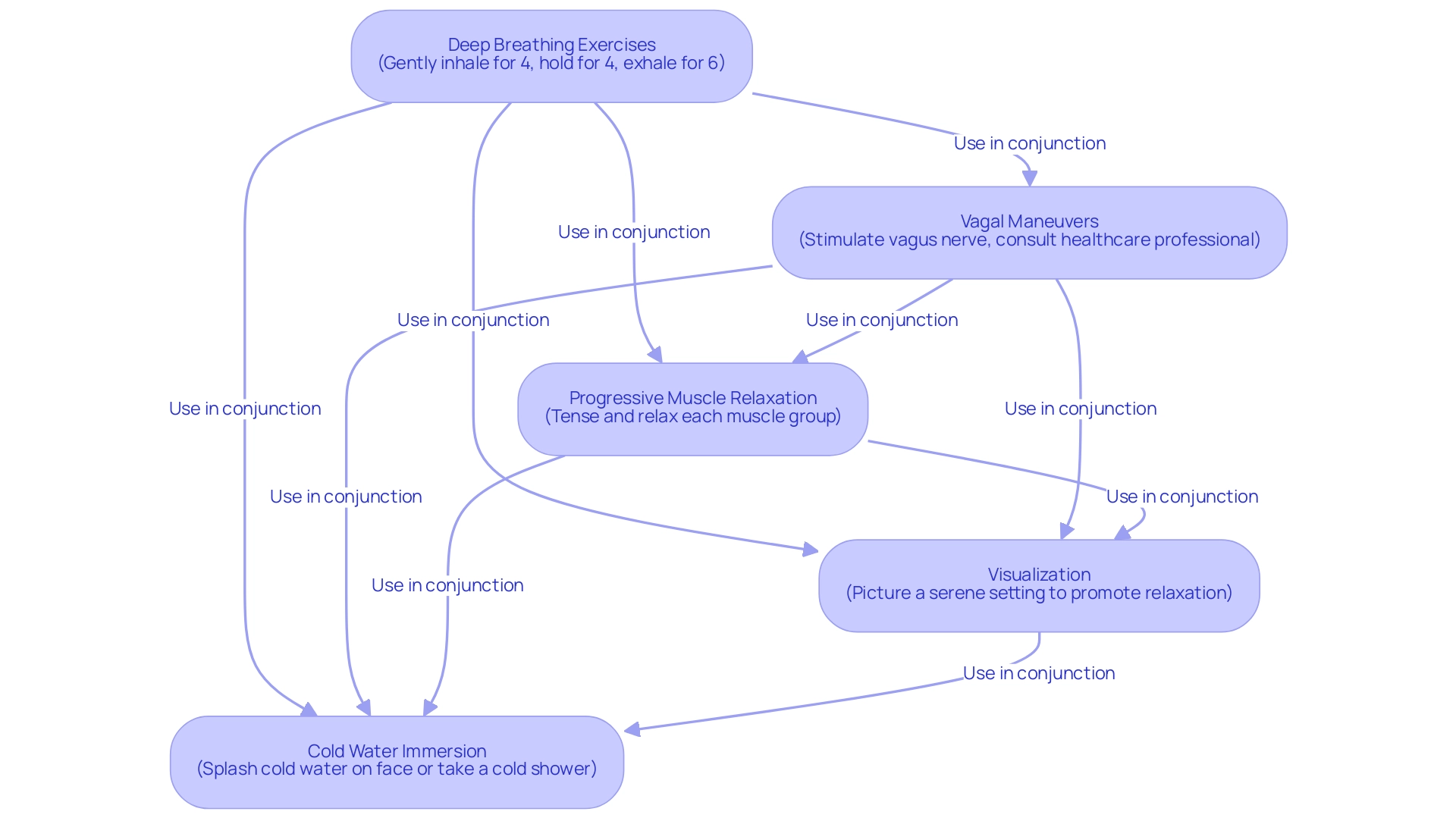
The Role of Nutrition in Heart Rate Management
To effectively manage your pulse rate through nutrition, consider these compassionate dietary recommendations:
-
Incorporate Omega-3 Fatty Acids: Introduce omega-3-rich foods into your diet, such as fatty fish like salmon and mackerel, as well as flaxseeds. These foods are recognized for their ability to reduce inflammation and may lower the risk of arrhythmias while improving arterial compliance, supporting overall well-being. As noted by Behram Khan, polyunsaturated fatty acids are significant in managing heart-related issues, highlighting their importance in critical care.
-
Eat a Balanced Diet: Focus on nurturing your body with whole foods, including a colorful variety of fruits, vegetables, whole grains, and lean proteins. This approach not only provides essential nutrients that enhance cardiovascular function but also promotes a sense of well-being.
-
Limit Processed Foods: Be mindful of your consumption of processed foods that are high in sugar, salt, and unhealthy fats, as they can have negative impacts on cardiovascular well-being and increase pulse. Opting for fresh, unprocessed options can make a significant difference in how you feel.
-
Stay Mindful of Portions: Consider eating smaller, more frequent meals throughout the day. This practice can help maintain stable blood sugar levels and prevent spikes in pulse rate, contributing to a calmer state of being.
- Hydrate with Herbal Teas: Herbal teas such as chamomile or hibiscus can provide soothing effects and promote cardiovascular well-being without the stimulating effects of caffeine present in standard tea or coffee. Integrating these calming drinks into your routine can be a gentle method to care for your well-being.
Recent studies emphasize the significance of omega-3 fatty acids, which contain approximately 0.50 g per capsule, as advantageous for cardiovascular wellness. In light of the conflicting results from the REDUCE-IT and STRENGTH trials regarding omega-3 supplementation strategies, it is recommended to consider pure EPA supplements or those with a higher EPA to DHA ratio. This recommendation is backed by case studies highlighting the significance of sustaining a heart-healthy diet and lifestyle modifications for overall cardiovascular well-being.
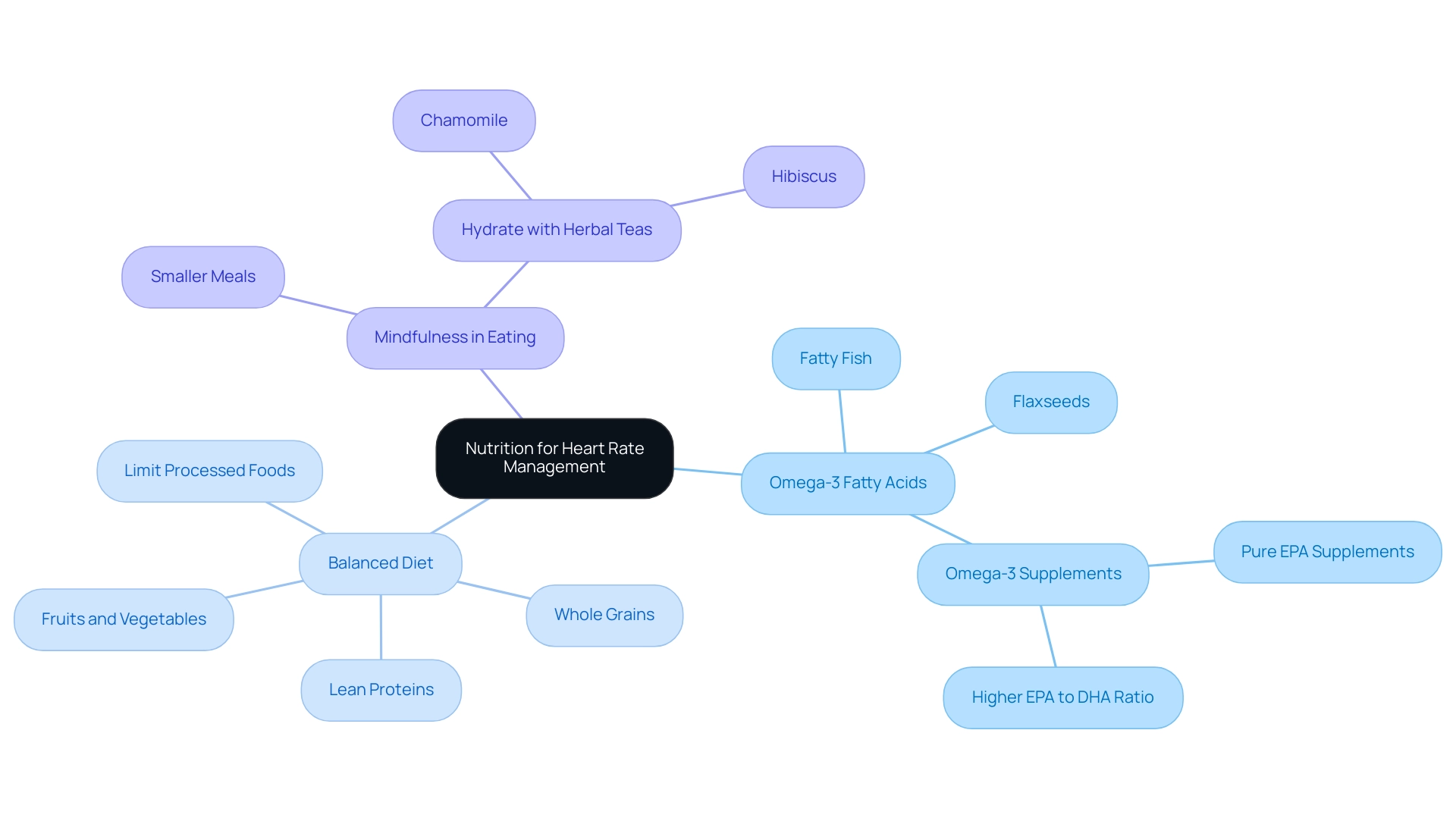
Monitoring Your Heart Rate: When to Seek Help
Tracking your pulse is an essential action in comprehending your well-being and can assist you in identifying troubling trends that might require attention. It is recommended to assess your resting pulse first thing in the morning, prior to getting out of bed. Here are some compassionate guidelines on when to seek help:
-
Persistent High Pulse: If your resting pulse consistently exceeds 100 beats per minute, it's important to consult a healthcare professional. Increased resting frequencies have been connected to heightened health hazards, with the Copenhagen City Heart Study showing that a higher resting pulse is related to cardiovascular and overall mortality. The Copenhagen Male Study also found significant correlations between high resting levels and mortality risk, emphasizing the importance of monitoring.
Accompanying Symptoms: It's essential to seek medical assistance if you encounter dizziness, chest pain, shortness of breath, or fainting along with an increased pulse. These symptoms often suggest that your body may be experiencing tension and requires professional evaluation.
Changes in Baseline: If you notice significant variations in your typical pulse patterns, especially after making lifestyle changes, it may be worthwhile to discuss these observations with your doctor. Understanding these changes can provide insights into your overall health. -
Mental Well-Being Issues: If anxiety or tension is persistently increasing your pulse rate, think about consulting a mental wellness expert. Addressing the emotional aspects can be just as important as physical monitoring and can provide you with valuable coping strategies.
-
Routine Check-ups: Make it a priority to arrange frequent medical examinations to assess your cardiovascular well-being. Discussing any concerns with your doctor can foster a proactive approach to your well-being. Remember, taking these steps is a sign of strength and self-care.
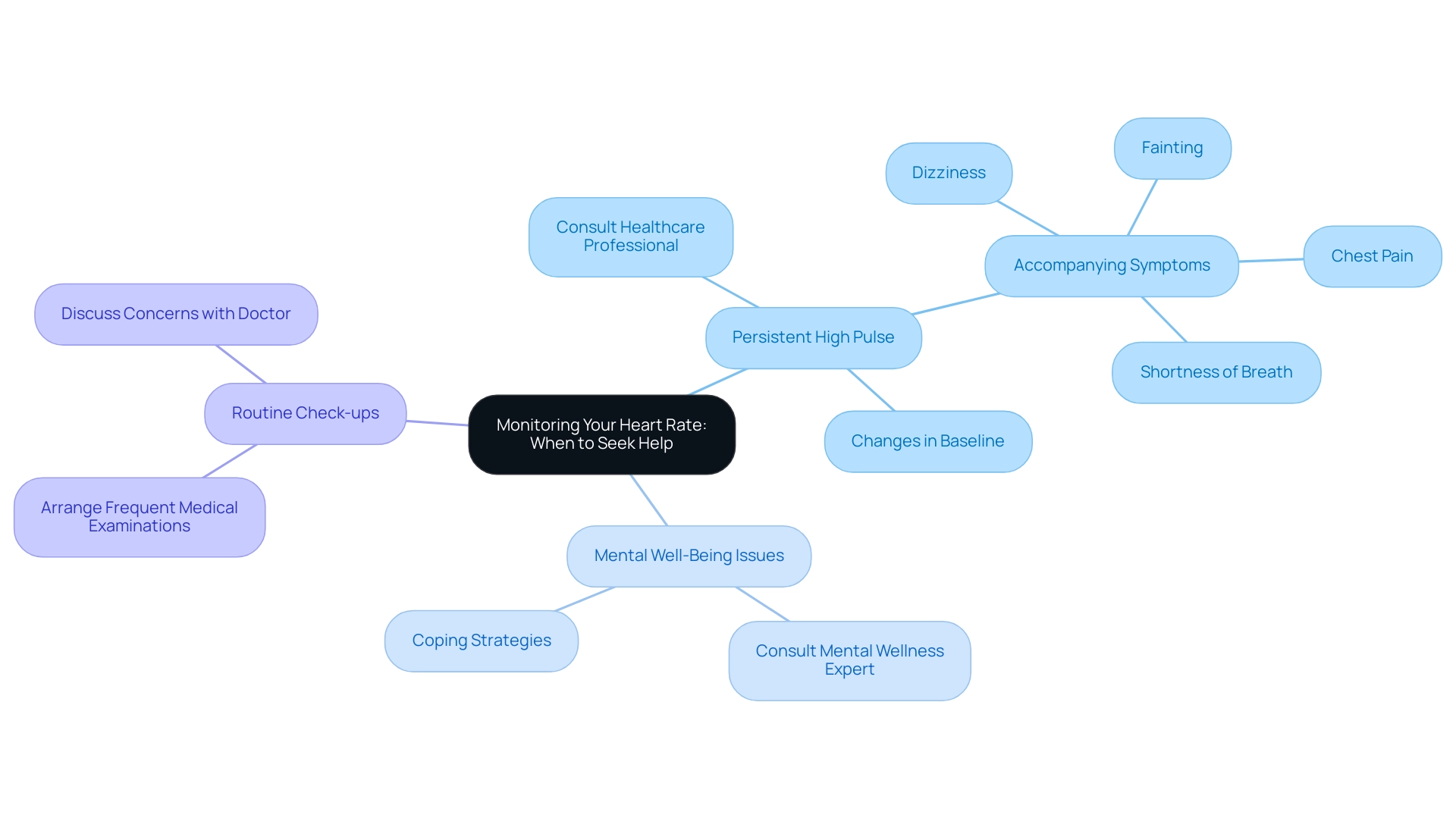
Managing Stress and Mental Health for a Healthier Heart
To effectively handle pressure and promote a healthier cardiovascular system, consider the following compassionate strategies, which can be further improved by participating in our personalized one-on-one therapy sessions:
- Practice Mindfulness Meditation: Engaging in mindfulness practices can ground you in the present moment, helping to alleviate anxiety and foster relaxation. Our one-on-one sessions can provide tailored guidance on mindfulness techniques that resonate with you, ensuring you develop a sustainable practice. Research shows that mindfulness meditation can result in significant decreases in tension levels, enhancing emotional well-being and heart health. According to the American Heart Association, individuals with elevated levels of chronic tension and anxiety have a significantly increased risk of developing cardiovascular disease, making these practices essential for those seeking peace of mind.
- Engage in Regular Physical Activity: Exercise serves as a powerful stress reliever, and finding activities you genuinely enjoy—such as dancing, hiking, or yoga—can make incorporating movement into your routine more enjoyable. In our sessions, we can help you identify physical activities that align with your interests and create a plan to incorporate them into your life. Research indicates that physical activity can not only enhance mood but also strengthen cardiovascular well-being, promoting a cycle of positive reinforcement that inspires ongoing participation.
- Establish Healthy Boundaries: Learning to say no and prioritizing your mental well-being by setting boundaries in both personal and professional spheres is crucial. By safeguarding your time and energy, you can greatly lower tension levels, enabling a more balanced and fulfilling life. Our therapy sessions can assist you in developing assertiveness skills to maintain these boundaries effectively.
- Seek Professional Assistance: If pressure feels overwhelming, don’t hesitate to reach out to a mental wellness expert, such as through our one-on-one sessions. Our trained specialists can provide tailored coping strategies and support to help you navigate challenging emotions and circumstances. This guidance is invaluable for fostering resilience and promoting cardiovascular health.
- Engage with Nature: Spending time outside can provide soothing benefits that reduce anxiety and improve cardiovascular well-being. Whether it’s a leisurely walk in the park or a hike in the mountains, immersing yourself in nature can rejuvenate your spirit and contribute positively to your overall well-being. Recent discussions about the effects of intermittent fasting on cardiovascular well-being underscore the importance of holistic approaches, including nature, in managing stress. It's important to be aware of the potential risks of intermittent fasting, as highlighted in a case study published on March 20, 2024, which suggests that extreme dietary changes can affect cardiovascular condition negatively. This further supports the need for a balanced approach to health management.
By implementing these strategies, along with the personalized support from our therapy programs, you foster a nurturing environment for both your mind and heart, paving the way for improved health and a more balanced life.
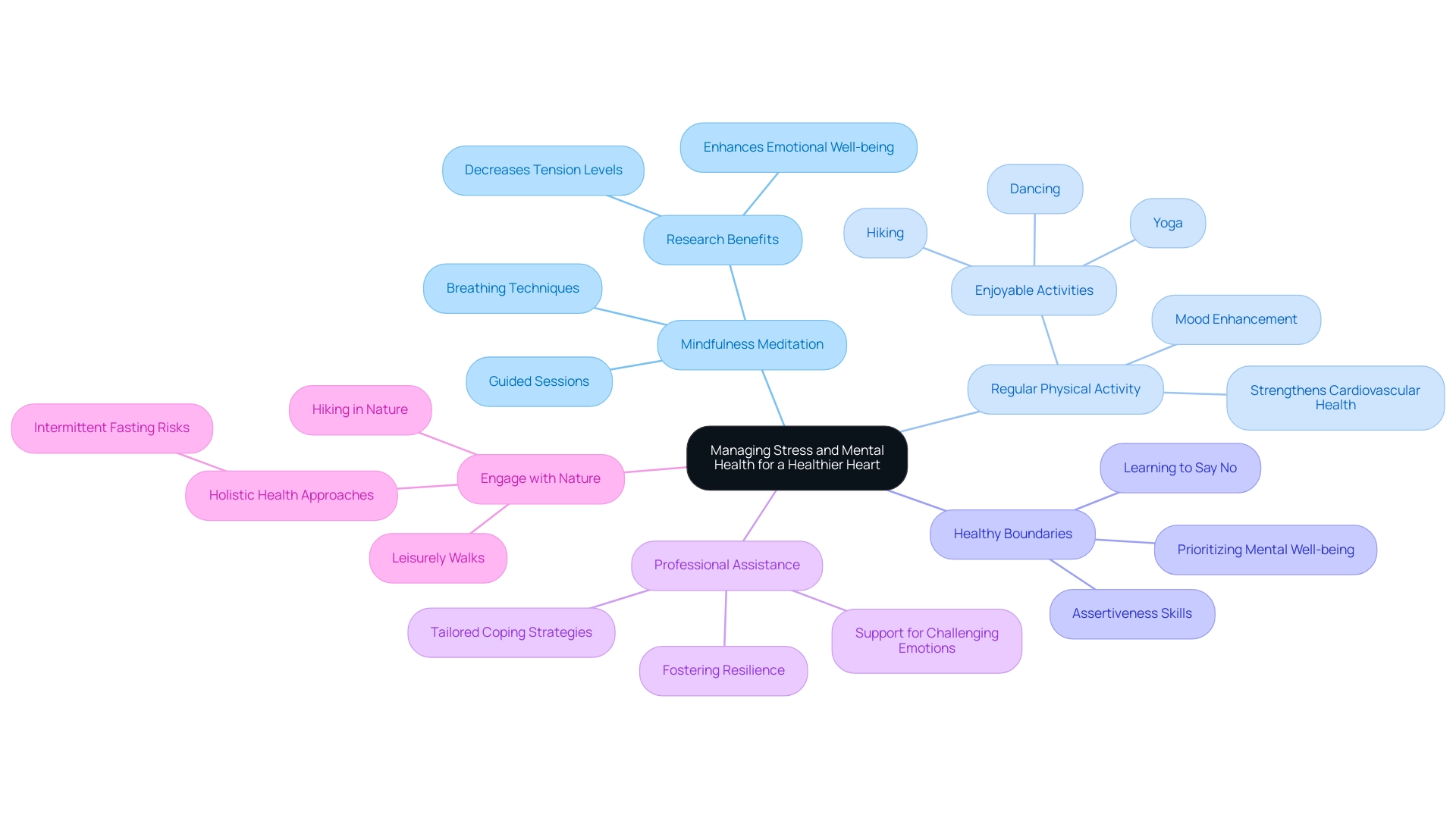
Conclusion
Incorporating compassionate strategies for heart health into daily life can yield significant benefits for both physical and emotional well-being. By making simple lifestyle changes such as staying hydrated, exercising regularly, and prioritizing sleep, individuals can create a nurturing environment that supports heart health and fosters a sense of calm.
Immediate techniques for calming a racing heart, like deep breathing exercises and progressive muscle relaxation, provide effective tools for managing anxiety and stress. Understanding the role of nutrition further enhances heart health; incorporating omega-3 fatty acids and maintaining a balanced diet are essential steps in this journey.
Monitoring heart rate and recognizing when to seek help is crucial for proactive health management. By addressing both physical and mental health concerns, individuals can take empowered steps towards a healthier heart. Engaging in mindfulness practices, setting healthy boundaries, and connecting with nature can significantly reduce stress levels, promoting a more balanced and fulfilling life.
Ultimately, nurturing heart health is about creating a holistic approach that encompasses lifestyle, nutrition, and emotional well-being. By embracing these strategies, individuals can cultivate resilience and pave the way for a healthier, more harmonious existence.




